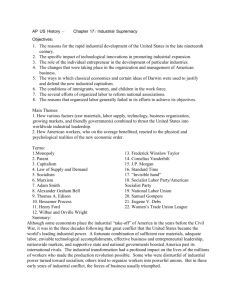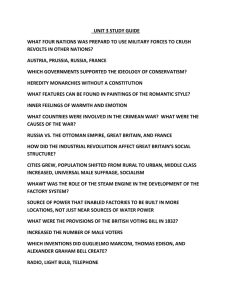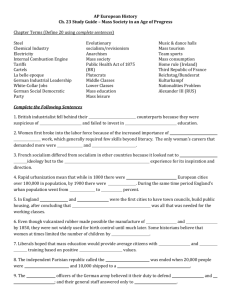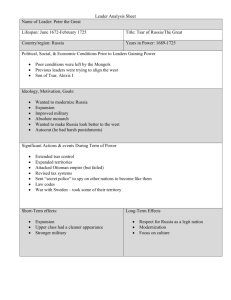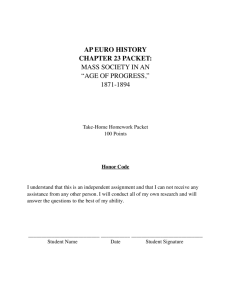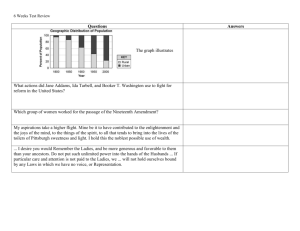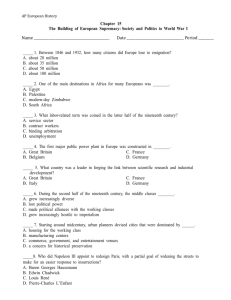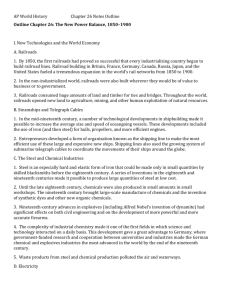Chapter 23 Reading Guide
advertisement
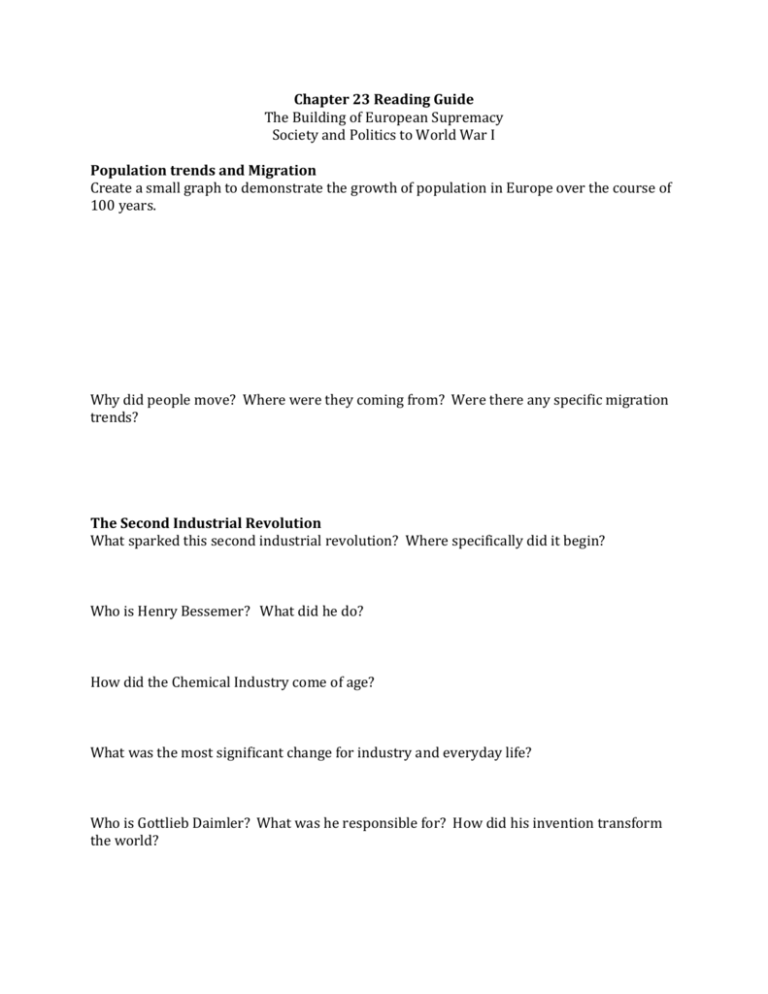
Chapter 23 Reading Guide The Building of European Supremacy Society and Politics to World War I Population trends and Migration Create a small graph to demonstrate the growth of population in Europe over the course of 100 years. Why did people move? Where were they coming from? Were there any specific migration trends? The Second Industrial Revolution What sparked this second industrial revolution? Where specifically did it begin? Who is Henry Bessemer? What did he do? How did the Chemical Industry come of age? What was the most significant change for industry and everyday life? Who is Gottlieb Daimler? What was he responsible for? How did his invention transform the world? Rise of the Middle Class Were all middle class families identical? Why or why not? Who are the petite bourgeoisie? What are consumer goods? How did they come about? Late-Nineteenth Century Urban Life Define Urbanization: Why was it necessary to redesign cities? What did the French do to Paris that was so revolutionary? How did the suburbs come to be? What are the top 5 most populated cities in Europe by 1910? (list city and country) With the growing and changing cities, how did they improve sanitation? (sewers? Water systems? Etc) How did they address public health and hygiene? (cholera) Did European governments provide any type of housing reform for the middle class? If so, give specific examples of what was given. Women’s rights (late-nineteenth century) During the nineteenth century, women’s social rights began to change. Please list the changes under the following categories… Women and Property Family Law Education Employment (what jobs were women taking? Did they receive the same pay? Did they stay in these jobs long?) How did women come to prostitution? What types of women became prostitutes? Was Prostitution legal? Discuss the “Cult of Domesticity.” What was it? Who belonged to it? What did they preach? What was the Cult’s views on Religion and Charity? Views on Sexuality and Family Size? Rise of Political Feminism Who are feminists? What do they want? What were some of the obstacles women faced? Who are suffragettes? Are there any noteworthy suffragettes? How did suffragettes do in Britain? Did the message of suffrage carry over to other European countries? Which ones? Are there any specific groups that formed? (give specifics) Jewish Emancipation Define Emancipation: Across Europe how did the 18th century treat Jews? Austria- Define Pogroms: RussiaGermanyItalyFrancePoland(others) Which countries afforded Jews the most opportunities? What types of things were offered? Define Anti-Semitism: Labor, Socialism, and Politics to World War I What are trade unions? When did they become “legal” and in which countries? How did Democracy spread through Europe? Did the idea of a democratic nation bring about more “political parties?” Was Socialism a popular ideology? Why or why not? Political Group First International Fabianism People Goals Outcome French Socialism Syndicalism German Socialism Reichstag? Revisionism Russia: Industrial Development and Bolshevism Who is Sergei Witte? What was the one thing that would help Russia Industrialize and Modernize? How did the emancipation of the serfs affect agriculture? Could the government remedy the problem? Why or why not? What are Kulaks? How did population growth affect Russia’s ability to industrialize/modernize? What are zemstovs? What did the Constitutional Democratic Party hope to achieve? Who is Vladimir Lenin? What were his beliefs? Where did he study? How did he propose to help Russia move into the 19th Century? Who are the Bolsheviks? Who are the Mensheviks? How are they different in terms of political goals? And goals for Russia? What specific events led up to the revolution of 1905? 1. 2. 3. 4. What happened on January 22, 1905? Do you think this event would change Russian politics? Who are the Soviets? What do they want? What is the Duma? FRQs: (practice writing thesis statements) 1. What were the major problems facing nineteenth century European cities? How and with what degree of success were these problems addressed? 2. How did European states’ intervention in the daily lives of ordinary people increase during the nineteenth century? Can you connect this intervention with trends in European thought? 3. The Place for women in the latter half of the nineteenth century seemed to be the home. Why? What other options did European women have? How did economic considerations affect women’s career decisions?
